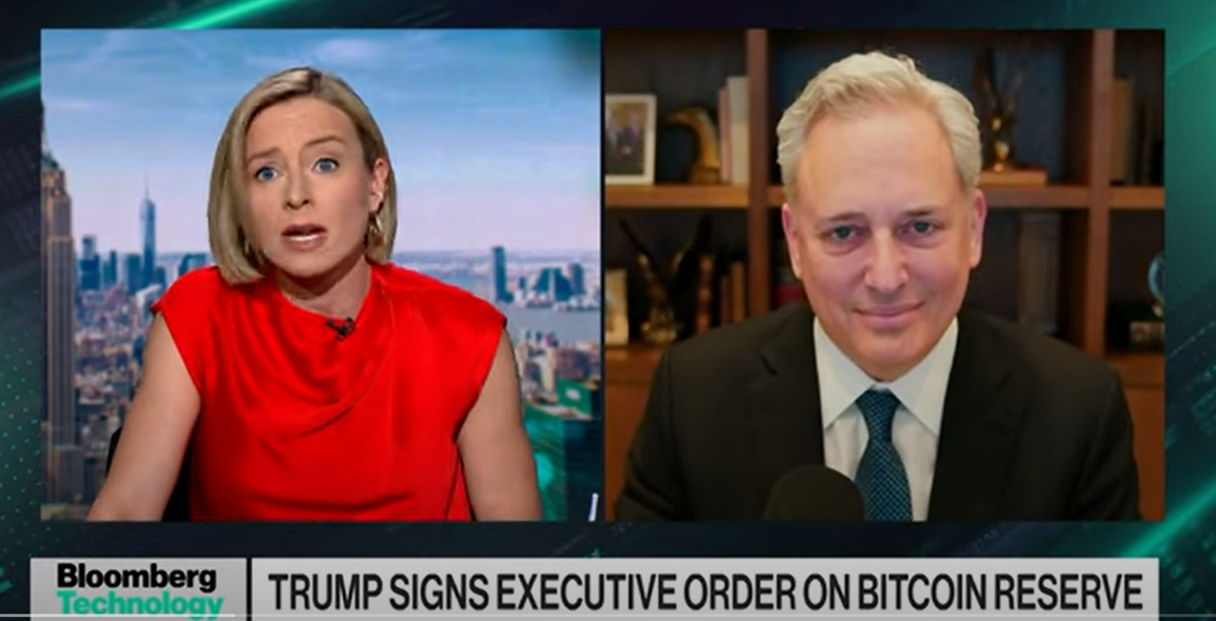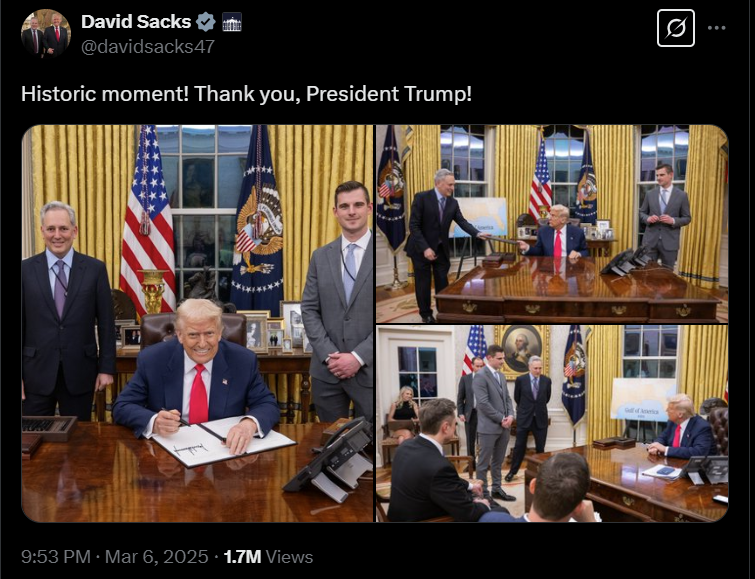"We have decided that Bitcoin is scarce and valuable, and will be included in the US strategic reserve" - David Sacks
Regarding Ethereum (ETH), Solana (SOL), XRP, and Cardano (ADA), Sacks stated: "The President only mentioned the top five cryptocurrencies by market cap, so I think people have overinterpreted that."
White House Crypto Czar David Sacks further elaborated on the US government's decision to view Bitcoin as a special reserve asset, calling it a "scarce" digital resource that could benefit the US in the long term.
In an interview with Bloomberg Technology on March 7, Sacks said: "We have decided that Bitcoin is scarce, it has value, and holding it as a long-term reserve asset is strategically important for the US."
Sacks specifically mentioned the approximately 200,000 Bitcoins currently owned by the US government. However, he also acknowledged that the exact number of Bitcoins held by the government is unclear, as a comprehensive audit has never been conducted.
"We will do a comprehensive government audit to find out what digital assets we actually have, so that they can be protected and incorporated into a strategy that can maximize their long-term value," he said.

David Sacks said the US government will build a strategic digital asset stockpile. Source: Bloomberg Technology
In the executive order signed on March 6, President Trump called for the establishment of a strategic Bitcoin reserve and digital asset reserve, and directed federal agencies to conduct a comprehensive audit of their Altcoin holdings.
Regarding the digital asset reserve, Sacks said: "The difference is that the Treasury Secretary [Scott Besent] will be responsible for managing these assets prudently, and he has the authority to rebalance the portfolio or sell off projects within it, but that doesn't apply to Bitcoin."
For the Bitcoin reserve, Sacks said: "The goal is to hold it long-term." He further explained, "Whereas for the reserve, the goal is essentially portfolio management."
Sacks mentioned that the investment strategy for digital assets may include the discretionary sale or even collateralization of digital assets by the Treasury Secretary.
Sacks did not specifically mention any particular Altcoins, and reminded everyone not to overinterpret President Trump's statement on March 2, which announced that Ethereum, Solana, XRP, and Cardano would be part of the reserve.
Sacks said: "The President only mentioned the top five cryptocurrencies by market cap, so I think people have overinterpreted that." Ultimately, which assets will be included will depend on the results of the government-wide audit.

Source: David Sacks
Industry Response
Trump's executive order and Sacks' comments did not immediately drive up the prices of Bitcoin and Altcoins, but this could change as the market delves deeper into the significance of the US's latest policy dynamics.
Joe Kelly, CEO of Bitcoin financial services company Unchained, told Cointelegraph: "The market may remain cautious until we see the scale and strategy behind this accumulation, but the bigger picture is not about short-term price fluctuations." He added:
"The factors that will truly shape Bitcoin's role in the global financial system are a clear and well-structured regulatory framework that fosters innovation. Within the right framework, Bitcoin's long-term impact will far exceed price volatility - redefining concepts of capital markets, financial sovereignty, and reserves."
Aurelie Barthere, Chief Research Analyst at Nansen, pointed to a line in the executive order that is "slightly bullish" for Bitcoin's short-term prospects: "The Treasury Secretary and Commerce Secretary are authorized to develop budget-neutral strategies to acquire more Bitcoin."
"Does this mean there could be some kind of asset swap, like exchanging Euros for Yen and then for Bitcoin?" Barthere asked.
Beyond the hype around the executive order, Barthere said Bitcoin's price trajectory is influenced by macroeconomic conditions, including potential changes in economic conditions and Federal Reserve policy.
Zheng Chenkai, former Global Head of Risk at Credit Suisse and founder of ZX Squared Capital, said: "I predicted at the beginning of the year that the recent pullback in Bitcoin prices was inevitable, as the broader financial markets need to digest the impact of Trump's tariff policies."
He stated: "I believe Bitcoin is currently in the process of bottoming out and will rebound in 2025 with the introduction of more crypto-friendly regulations."
Zheng Chenkai believes that a strategic Bitcoin reserve could become a catalyst for future national adoption of Bitcoin.








